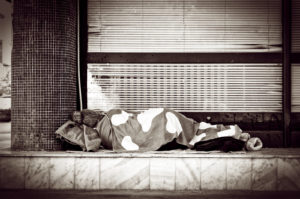Connecting Medical Care and Social Services
May 10, 2018 · NCQA Communications
It’s a fact that people who are homeless, unemployed, experiencing addiction or have similar challenges in life are more likely to become sick or ignore their health altogether.  And studies show us that if people’s social needs are resolved, they can have healthier outcomes. So why aren’t we doing more to connect social services and the health care community?
And studies show us that if people’s social needs are resolved, they can have healthier outcomes. So why aren’t we doing more to connect social services and the health care community?
For one, most practices do not have mechanisms in place for referring patients to those kinds of services. Likewise, most community-based organizations do not have electronic records and cannot easily communicate with practices’ electronic health records. Finally, issues of protected health information and privacy have also blocked progress in this area.
Addressing social risk factors is challenging. But that’s not keeping us from doing something about it.
Connecting Medical Care and Social Services
NCQA is working with the Medical Home Network (MHN) on a joint research project to study the effects of connections between patient-centered medical homes (PCMH) and community-based organizations (CBO). This grant is managed by the Systems for Action National Program Office with support from the Robert Wood Johnson Foundation.
Through this research, we will investigate the impact of connecting medical homes and CBOs using a web-based system. We hope to understand how those connections affect the use of hospital and emergency department services, and affect health outcomes of at-risk populations.
“We want to see how connecting medical and social service care teams can help people with social risks,” said Sarah Hudson Scholle, Vice President of Research & Analysis, NCQA. “For example, if the medical care team and social service agencies coordinate to help people with immediate problems (substance abuse, food, housing, jobs), will that help them manage their health needs better or keep them out of the hospital?”
A Partnership with a Purpose
NCQA, MHN and Cook County Health & Hospitals System (CCHHS) are partnering in this effort with medical homes and CBOs in Cook County, Illinois. As many as 200 medical homes and 25 hospitals will link to a variety of CBOs using a web-based communication and care management platform, known as MHNConnect.
This new connectivity between social service agencies and medical homes is the latest innovation in the network facilitated by MHN. It adds to a system that already connects 200 medical homes and 25 hospitals in Cook County, Illinois, serving one of the largest Medicaid managed care populations in the country.
“Economic opportunities, housing, legal resources and access to food- these social determinants all play a significant role in a person’s ability to get and stay healthy,” said Dr. Jay Shannon, CEO, CCHHS. “This project will help us understand where providers like Cook County Health can work more effectively with social service groups to improve our patients’ health status.”
MHN connects a community of healthcare providers, which enables enhanced care coordination using better workflows and bidirectional communication between care teams and community agencies.
“Our care management process incorporates addressable medical, behavioral and social factors and promotes whole-person care. We are connecting in a way that enables meaningful conversations and collaborative care management between medical homes, health systems, health plans and the community agencies, which is critical to providing coordinated, patient centered care for those we serve,” said Cheryl Lulias, president and executive director, Medical Home Network.
If successful, the implementation project will foster further cross-sector collaboration to benefit the patient population’s health and well-being.








